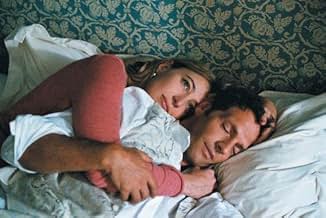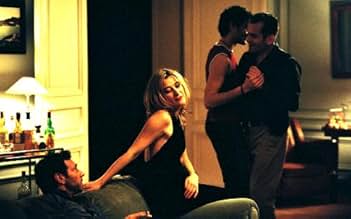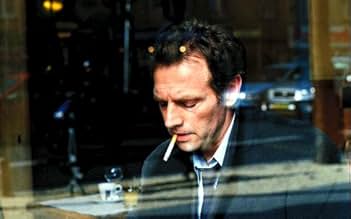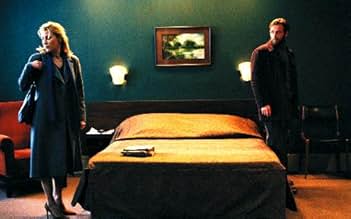IMDb-BEWERTUNG
6,6/10
10.680
IHRE BEWERTUNG
Fünf Phasen in der Romanze zwischen einer Frau und einem Mann.Fünf Phasen in der Romanze zwischen einer Frau und einem Mann.Fünf Phasen in der Romanze zwischen einer Frau und einem Mann.
- Regie
- Drehbuch
- Hauptbesetzung
- Auszeichnungen
- 1 Gewinn & 2 Nominierungen insgesamt
Valeria Bruni Tedeschi
- Marion
- (as Valeria Bruni-Tedeschi)
Ninon Brétécher
- Sophie
- (as Ninon Bretecher)
Empfohlene Bewertungen
The 'reverse chronology' format, that has now been tried and tested a few times, will perhaps one day become as unshockingly acceptable as the more prosaic use of 'flashbacks'. Both involve non-linear storytelling, and both attempt to grab audience attention by time distortions. Flashbacks are now so commonplace within mainstream films that the 'purist' Dogme movement banned them altogether being so structurally clichéd and rarely justified. So when Ozon's 5 x 2 tells a love story about two people in five chapters, but starting with the last chapter and working forward, is he using a valid artistic device or just being gimmicky? In the opening scene, our loving couple (Marion and Gilles) are finalising the details of their divorce. Afterwards they have a last-fling sexual bout which takes an unpleasant turn. Flipping back scene by scene, we next see them as a loving married and entertaining visitors, chatting away about fidelity and sexual deviance and again we see a slightly unpleasant turn perhaps the seeds of the divorce that we already know will happen. In each chapter we follow the love story to earlier and earlier stages.
In Irreversible, another French film, the reverse chronology format was used to shock, to take us on a journey from hell to heaven. In Memento it was used to heighten suspense and provide the basic device that the mystery revolved upon we never knew more than the main character about what had happened before.
In 5 x 2 the effect is to highlight small things that go wrong in a fairly ordinary relationship. If it were a gradual decline from better to worse they might have gone unnoticed, but our starting point being divorce our interest in why things went wrong is perhaps more acute.
The other thing that marks out this slightly unusual film is the remarkable acting range shown by Valeria Bruni Tedeschi (who won Best Actress at the Venice Film Festival for her portrayal of Marion). We see not only an incredible range of emotion but many sides to her character. The finely nuanced performance draws attention to things like the person a woman may be to her husband whilst still have a secret side, or her ability to put on a brave face when crying inside. The observation of a range of emotional and sexual explorations is done with the attention to detail that seems so intrinsic to much French cinema: the characters really seem to feel what is happening as if there is no camera on them at all. Sadly 5 x 2 however may not have the shock value of film like Irreversible or the sugar-candy feelgood factor of films like Amelie: mainstream foreign audiences like their French movies to nevertheless fulfil certain passive entertainment criteria, which this thinking and understated movie obstinately refuses to do.
In Irreversible, another French film, the reverse chronology format was used to shock, to take us on a journey from hell to heaven. In Memento it was used to heighten suspense and provide the basic device that the mystery revolved upon we never knew more than the main character about what had happened before.
In 5 x 2 the effect is to highlight small things that go wrong in a fairly ordinary relationship. If it were a gradual decline from better to worse they might have gone unnoticed, but our starting point being divorce our interest in why things went wrong is perhaps more acute.
The other thing that marks out this slightly unusual film is the remarkable acting range shown by Valeria Bruni Tedeschi (who won Best Actress at the Venice Film Festival for her portrayal of Marion). We see not only an incredible range of emotion but many sides to her character. The finely nuanced performance draws attention to things like the person a woman may be to her husband whilst still have a secret side, or her ability to put on a brave face when crying inside. The observation of a range of emotional and sexual explorations is done with the attention to detail that seems so intrinsic to much French cinema: the characters really seem to feel what is happening as if there is no camera on them at all. Sadly 5 x 2 however may not have the shock value of film like Irreversible or the sugar-candy feelgood factor of films like Amelie: mainstream foreign audiences like their French movies to nevertheless fulfil certain passive entertainment criteria, which this thinking and understated movie obstinately refuses to do.
The reverse chronology brings together what all too often tears us apart, wait it's love, love that tears us apart. Marriage really is a different thing altogether.
The film feels to a degree like flipping through old photographs, nostalgia is a form of pain, right? What was interesting was to see the actors really portraying quite different characters in the five sets, although had I seen the French Remix where the scenes are re-reversed, perhaps it would have all seemed more fated and just an unwrapping of a bitter, broken wedding gift.
I did wonder if the movie was filmed in proper chronological order.
There is something about maid Marion's parents, that is placed on a very tiny pedestal, without much explanation. I found compassion in watching Valerie Bruni-Tedeschi here...while her lesser half did not get much of a fair chance at redemption.
All of us, and all of our partners are flawed. But perhaps not all relationships are fatally flawed. Find someone emotionally compatible and give it a shot, maybe savor the best memories periodically. Good luck...
The film feels to a degree like flipping through old photographs, nostalgia is a form of pain, right? What was interesting was to see the actors really portraying quite different characters in the five sets, although had I seen the French Remix where the scenes are re-reversed, perhaps it would have all seemed more fated and just an unwrapping of a bitter, broken wedding gift.
I did wonder if the movie was filmed in proper chronological order.
There is something about maid Marion's parents, that is placed on a very tiny pedestal, without much explanation. I found compassion in watching Valerie Bruni-Tedeschi here...while her lesser half did not get much of a fair chance at redemption.
All of us, and all of our partners are flawed. But perhaps not all relationships are fatally flawed. Find someone emotionally compatible and give it a shot, maybe savor the best memories periodically. Good luck...
"5x2" is not the first film to explore a relationship by going backwards from its end to its beginning (Pinter's "Betrayal" comes to mind let alone the mystery in "Memento").
But writer/director François Ozon, aided by superb acting, uses the structure for a thoughtful and intriguing commentary on love and marriage.
The first scene sets up our curiosity as while a lawyer dryly reads the divorce agreement, letting us know the cold facts of the marriage, there is palpable electricity between the about to be ex-wife and husband such that we are not surprised when they immediately head to a hotel, as it turns out their relationship started in a hotel.
We are introduced to the complexities between this couple as their layers are played out through a sexual encounter that is open to "he said, she said" interpretations that will continue as we flashback to key points in their relationship. The other four incidents show them as parents, at the birth of their child, at their wedding and at their meeting, all played out in relation to her parents' long-time conflicted marriage and his brother's homosexual arrangements, amid other encounters.
Valeria Bruni Tedeschi is so luminous as "Marion" that I'm not sure if it's her beautiful acting, as she is in turn up-tight, conflicted, sensual, fragile or aggressive, or her character who changes or that François Ozon is such a sensitive director of women, as he showed in "Swimming Pool" and "Under the Sand (Sous le sable)", that I favored her character, even if we gradually learn that she may or may not be as much of a victim as it seems and she is as much influenced by physical imperatives as he is. Stéphane Freiss plays virtually the opposite of his caring husband in "Le Grand Rôle," even if it becomes less and less clear he's the S.O.B. he at first could appear to be, or if his character experiences any changes or learns anything through serial somewhat monogamy, especially because some details in their past are just left mysterious.
The film is certainly not optimistic about love being an effective basis for a man and a woman to sustain a long term relationship and it leaves open-ended for a gendered discussion about whether that applies to the particulars of these individuals, or to them as French or as Europeans, vs. universals, as Americans would probably interpret their interactions differently than other audiences.
Certainly, in a frankly sexually mature film it's nice to see non-Hollywood bodies, of a zaftig woman and a guy without a personal trainer credit listed.
The frequent use of Paolo Conte songs on the soundtrack add to the ironic feeling surrounding the film, even if the lyrics aren't translated in the many white-on-white subtitles.
Going off into the sunset, and the cinematography and production design, from dark to light, throughout are lovely, hasn't had such an ironic conclusion since the original "Planet of the Apes."
But writer/director François Ozon, aided by superb acting, uses the structure for a thoughtful and intriguing commentary on love and marriage.
The first scene sets up our curiosity as while a lawyer dryly reads the divorce agreement, letting us know the cold facts of the marriage, there is palpable electricity between the about to be ex-wife and husband such that we are not surprised when they immediately head to a hotel, as it turns out their relationship started in a hotel.
We are introduced to the complexities between this couple as their layers are played out through a sexual encounter that is open to "he said, she said" interpretations that will continue as we flashback to key points in their relationship. The other four incidents show them as parents, at the birth of their child, at their wedding and at their meeting, all played out in relation to her parents' long-time conflicted marriage and his brother's homosexual arrangements, amid other encounters.
Valeria Bruni Tedeschi is so luminous as "Marion" that I'm not sure if it's her beautiful acting, as she is in turn up-tight, conflicted, sensual, fragile or aggressive, or her character who changes or that François Ozon is such a sensitive director of women, as he showed in "Swimming Pool" and "Under the Sand (Sous le sable)", that I favored her character, even if we gradually learn that she may or may not be as much of a victim as it seems and she is as much influenced by physical imperatives as he is. Stéphane Freiss plays virtually the opposite of his caring husband in "Le Grand Rôle," even if it becomes less and less clear he's the S.O.B. he at first could appear to be, or if his character experiences any changes or learns anything through serial somewhat monogamy, especially because some details in their past are just left mysterious.
The film is certainly not optimistic about love being an effective basis for a man and a woman to sustain a long term relationship and it leaves open-ended for a gendered discussion about whether that applies to the particulars of these individuals, or to them as French or as Europeans, vs. universals, as Americans would probably interpret their interactions differently than other audiences.
Certainly, in a frankly sexually mature film it's nice to see non-Hollywood bodies, of a zaftig woman and a guy without a personal trainer credit listed.
The frequent use of Paolo Conte songs on the soundtrack add to the ironic feeling surrounding the film, even if the lyrics aren't translated in the many white-on-white subtitles.
Going off into the sunset, and the cinematography and production design, from dark to light, throughout are lovely, hasn't had such an ironic conclusion since the original "Planet of the Apes."
A film that suggests a cross between Bergmans's gut-wrenching "Scenes From a Marriage" (1973) and Stanley Donen's more lighthearted "Two For the Road" (1967), mixed in a bit with that backwards "Seinfeld" episode, "5X2" (2005) is a very fine adult drama from director Francois Ozon. As the title suggests, it is comprised of five short glimpses at the doomed relationship of a handsome professional couple, Marion (Valeria Bruni-Tedeschi) and Gilles (Stephane Freiss). As in "Two For the Road," we see unchronological snapshots of this couple's failing marriage, but unlike the '67 film, rather than being given scattershot scenes from various periods, here we proceed continuously backward in time: from the divorce settlement and its rather icky aftermath, backward to one of the couple's dinner parties, back still to the birth of their premature son, on to their wedding party (and a most unusual wedding night, to put it mildly), and all the way back to one of their first meetings. Our foreknowledge that the couple's marriage is doomed makes the cracks in Marion and Gilles' relationship stand out all the clearer. Consequently, the pretty, upbeat ending is rendered bittersweet at best, with our preglimpse of what their future holds. "5X2" has been finely put together and features sterling acting down to the smallest bit players. It was especially great for me seeing that grand old actor, Michael Lonsdale (who will always be Hugo Drax for us Bond fanatics), still acting at age 74, here playing Marion's father. My only complaint, really, concerning "5X2" is that it is a bit on the short and sketchy side; perhaps a few extra scenes would have enabled us to more fully understand the characters' motivations, particularly Gilles' (and especially his no-show at his son's birth). This, for me, is the only thing that prevents "5X2" from being a perfect 10.
5x2 comes as a slight let-down following director Francois Ozon's recent critical and commercial success with Swimming Pool.Ozon's decision to structure the film in an anti-linear fashion is nothing original and he himself admits he was influenced by Jane Campion's little-known TV film Two Friends (1985) which used the same structure. Ozon chooses 5 crucial scenes from the life of Marion and Gilles, a middle-class couple with a son, Nicholas, whose married life quickly disintegrates into divorce. Ozon begins with the austere divorce, finishing with the moment this would-be-couple met.
The reverse structure allows the viewer to consider what went wrong and decipher why the marriage ended so bitterly. It is fairly obvious the reasons why they divorced, but Ozon and his frequent collaborator, Emmanuelle Bernhein, are as interested in the psychological worlds of these two people as their mundane reality.
The film works for the most part, but some scenes are unbelievable: Gilles's boastful confession at the party with his brother; the scene in the woods with Marion and an American tourist. These scenes undermine the subtle nature Ozon employs elsewhere. He explains too much, which isn't his style. A better edit would have made this an even better film.
As for the music, the corny 1960's Italian love songs used to close each segment are plain awful. The triviality of the songs might offer an ironic counterbalance to what is happening on screen, but the effect is of a sneering, sardonic detachment on behalf of the director. It's as if Ozon wants to dismiss every aspect of romantic culture as a fallacy.The best musical segment is at the end where Ozon's longtime composer Philippe Rombi returns some panache to the film's audio sensibilities. Special mention should go to Paolo Conte's haunting Sparring Partner which is used in the dinner scene and in the final credits.
The acting is excellent,and the closing frame is a masterstroke.But it doesn't merit that many repeat viewings as his earlier Swimming Pool did.
The reverse structure allows the viewer to consider what went wrong and decipher why the marriage ended so bitterly. It is fairly obvious the reasons why they divorced, but Ozon and his frequent collaborator, Emmanuelle Bernhein, are as interested in the psychological worlds of these two people as their mundane reality.
The film works for the most part, but some scenes are unbelievable: Gilles's boastful confession at the party with his brother; the scene in the woods with Marion and an American tourist. These scenes undermine the subtle nature Ozon employs elsewhere. He explains too much, which isn't his style. A better edit would have made this an even better film.
As for the music, the corny 1960's Italian love songs used to close each segment are plain awful. The triviality of the songs might offer an ironic counterbalance to what is happening on screen, but the effect is of a sneering, sardonic detachment on behalf of the director. It's as if Ozon wants to dismiss every aspect of romantic culture as a fallacy.The best musical segment is at the end where Ozon's longtime composer Philippe Rombi returns some panache to the film's audio sensibilities. Special mention should go to Paolo Conte's haunting Sparring Partner which is used in the dinner scene and in the final credits.
The acting is excellent,and the closing frame is a masterstroke.But it doesn't merit that many repeat viewings as his earlier Swimming Pool did.
Wusstest du schon
- WissenswertesIn the French edition of the DVD, the director offers a version of the movie titled "2 x 5". This version shows the five sequences in the chronological order, from the moment the couple meets till their divorce. Subtle editing work has been applied to make the movie work.
- PatzerThe scene where the American came to Marion during the wedding night and introduced himself who arrived in France today and would leave tomorrow for LA. Who would just do that? It's just lame.
(Answer: someone not coming from the USA, for instance.)
Top-Auswahl
Melde dich zum Bewerten an und greife auf die Watchlist für personalisierte Empfehlungen zu.
- How long is Five Times Two?Powered by Alexa
Details
- Erscheinungsdatum
- Herkunftsland
- Offizielle Standorte
- Sprachen
- Auch bekannt als
- Five Times Two
- Drehorte
- Produktionsfirmen
- Weitere beteiligte Unternehmen bei IMDbPro anzeigen
Box Office
- Budget
- 5.250.784 € (geschätzt)
- Bruttoertrag in den USA und Kanada
- 128.752 $
- Eröffnungswochenende in den USA und in Kanada
- 15.667 $
- 12. Juni 2005
- Weltweiter Bruttoertrag
- 7.444.906 $
- Laufzeit1 Stunde 30 Minuten
- Sound-Mix
- Seitenverhältnis
- 1.85 : 1
Zu dieser Seite beitragen
Bearbeitung vorschlagen oder fehlenden Inhalt hinzufügen


























